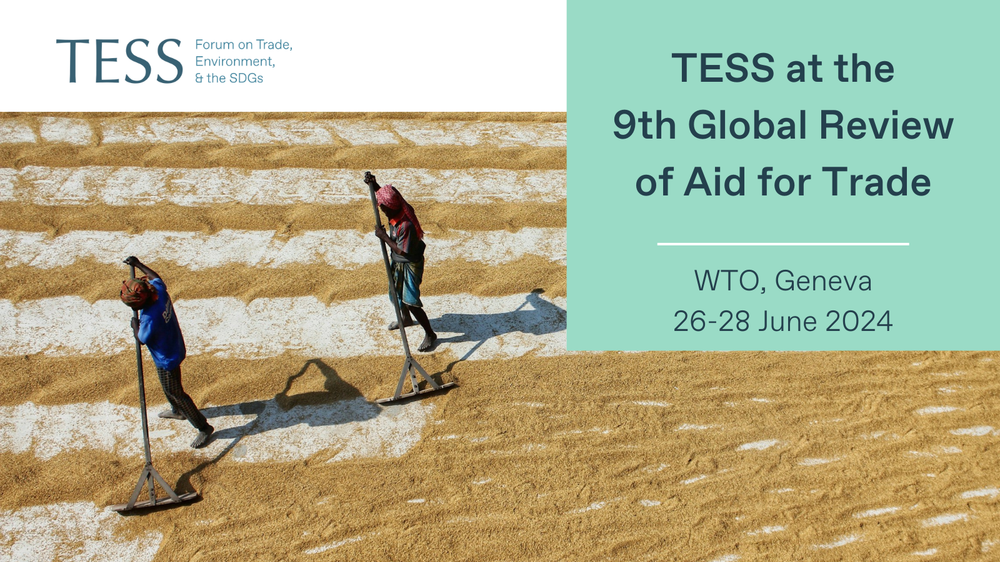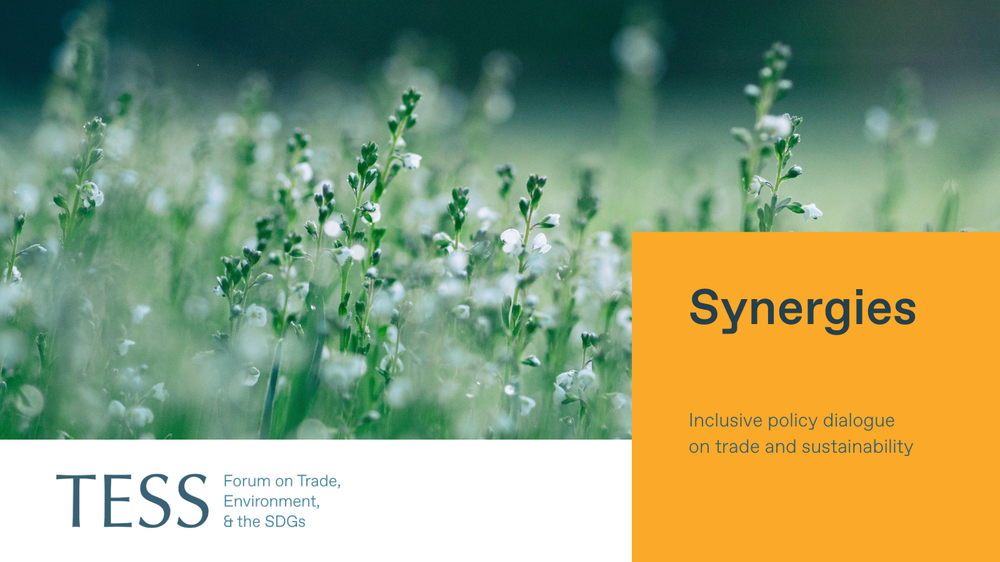As governments and stakeholders gathered in Geneva from 26–28 June 2024 for the 9th Global Review of Aid for Trade, the week was a key opportunity to reinforce international cooperation on aid for trade and financing for sustainability in trade.

From 26–28 June 2024, the 9th Global Review of Aid for Trade was hosted by the World Trade Organization in Geneva. The global review offered a vital opportunity to explore how to strengthen international cooperation on aid for trade and financing in support of the trade and sustainable development priorities of developing countries, including in relation to urgent environmental challenges. You can access the full programme of the 9th Global Review of Aid for Trade, including live webcasts of the high-level sessions.
TESS participated in a number of sessions as co-host or speaker, focusing on ways to boost international cooperation on aid for trade and sustainability. You can find more information on these sessions below, along with links to TESS publications on aid for trade and financing.
Events TESS Co-Hosted at the Global Review
Nationally Determined Contributions 3.0: Trade, Finance, and Investment Gaps and the Role of International Cooperation and Aid for Trade
26 June 2024 – 13:00-14:00 – WTO, Room CR
Organizers: UN Trade and Development, WTO Secretariat, TESS
This session provided an opportunity to explore views from WTO members on how economies can leverage trade and investment policies—and international cooperation on such policies—to achieve nationally determined contributions in the context of the Paris climate goals and how climate objectives can offer new trade and investment opportunities for sustainable development. The discussion also explored the capacity gaps to be addressed for developing economies to reflect trade, finance, and investment considerations, priorities, and policies in their nationally determined contributions 3.0. Speakers shared their experiences, challenges, and priorities in regard to the formulation of trade and climate strategies that support climate-resilient development, and the role of international cooperation and aid for trade.
----------
What Do Developing and LDC Members Need to Implement Trade-Related Policies to Tackle Plastic Pollution?
28 June 2024 – 09:00-10:00 – WTO, Room S2
Organizers: WTO Dialogue on Plastic Pollution, TESS
Partners: World Bank, UN Trade and Development, Barbados, China
This session presented the efforts of the WTO Dialogue on Plastic Pollution (DPP) to identify and spur cooperation on the trade-related capacity building and technical assistance needs of developing and least developed members, small island developing states, and small vulnerable economies, and to consider plastic pollution and environmentally sustainable plastics trade in aid for trade. The session reviewed the outcomes of a factual report addressing five key questions related to tackling plastic pollution in aid for trade, as well as the DPP’s MC13 ministerial statement, which highlights the importance of addressing trade-related capacity building and technical assistance needs.
Related TESS Activities
TESS activities on sustainability, trade, and finance are premised on an understanding that achieving a trading system that catalyses and supports the huge economic transformations and just transitions that sustainability requires will necessitate greater and more effective international partnerships and financing. Aid for trade is an important component of the enhanced financing and international cooperation needed.
In the lead-up to the 9th Global Review of Aid for Trade, on 7 June, we hosted in Geneva the second in our series of Ambassadors’ Roundtables on Trade and Sustainability. At the roundtable, a diverse group of ambassadors reflected on priorities and opportunities related to aid for trade and financing for sustainability in trade. The discussion highlighted the importance of renewed political focus on the importance of aid for trade for effective and just transitions to sustainability, and the need to catalyse further financing and supportive policy and regulatory frameworks. Questions for consideration included how can international cooperation on aid for trade and financing be strengthened in ways that support sustainability in trade? How can aid for trade support countries to pursue opportunities arising from the shift to sustainability and address trade-related challenges linked to the green transition? What approaches work most effectively? What are the opportunities for enhancing coherence and synergies between development assistance, other sources of financing, and policy frameworks to enhance sustainability in trade?
Earlier, on 7 May, we hosted a roundtable of WTO delegates and experts on Green Subsidies, Trade, and Sustainable Development: Priorities for Enhanced International Cooperation on Financing Sustainability. As a number of large economies announce significant subsidies to drive climate action and green transitions in a range of sectors, participants were asked to discuss priorities and prospects for enhanced international cooperation on subsidies. Notably, a core theme of discussion was on the need and possible pathways for wider international cooperation on financing and trade to address the climate crisis in the context of sustainable development priorities.

TESS also published three independent expert views in our blog Synergies, each of which explored recent developments and possible approaches to climate finance with a trade dimension—carbon markets, climate technology investments and carbon credits, and carbon pricing mechanisms. The first, authored by David Luke and Cecilia Wandiga and published on 22 February, looks at the unfinished business from COP28 of establishing a regulatory framework on carbon markets, including pricing and trading of carbon credits and offsets. The second, authored Brad McDonald and Scott Vaughan and also published on 22 February, discusses how future deals under Article 6 of the Paris Agreement could include the transfer of climate technologies directly from home to host country, either at prevailing market prices or at deeply discounted or below market rates, in exchange for carbon credits. The third, authored by Goran Dominioni and published on 30 May, reviews the state of play at the International Maritime Organization on proposals for a carbon pricing mechanism that targets greenhouse gas (GHG) emissions from shipping, highlighting the trade law dimensions and the potential for revenues from a GHG pricing mechanism to be a new and additional source of climate finance.
----------
Finally, we invite you to read the following papers on aid for trade by TESS staff. Over the past two years, the Enhanced Integrated Framework has published short pieces by Carolyn Deere Birkbeck on how can we harness aid for trade for a just transition to sustainable trade and by Mahesh Sugathan on how aid for trade can help least developed countries tackle the plastic pollution crisis. Each of these articles are drawn from the following two papers.
Greening Aid for Trade: Future Priorities and Pathways for a Just Transition to Sustainable Trade
Carolyn Deere Birkbeck I October 2022
This report, co-published with IISD, argues that greening aid for trade requires a nuanced approach that pursues simultaneous action through six complementary pathways underpinned by the sustainable development priorities of developing and least developed countries.
Aid for Trade Priorities on Plastic Pollution
Mahesh Sugathan I May 2022
This policy brief explores how aid for trade could be harnessed to support developing and least developed countries to address the trade-related aspects of the plastic pollution crisis in a manner that is aligned with their priorities and needs. It suggests a set of options on aid for trade and plastic pollution that WTO members could pursue through the Dialogue on Plastics Pollution and related cooperation at the WTO.
